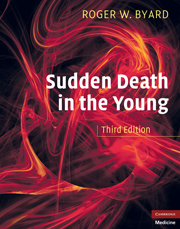Book contents
- Frontmatter
- Contents
- Preface to the third edition
- Reviews of the first and second editions
- Acknowledgments
- Section 1 Introduction
- Section 2 Unintentional trauma
- Section 3 International trauma
- Section 4 Natural disease
- Section 5 Maternal, fetal, and neonatal conditions
- Section 6 Sudden infant death syndrome
- Appendices
- Appendix I Autopsy information pamphlet
- Appendix II The Sudden Unexplained Infant Death Investigation Report Form
- Appendix III Pediatric forensic autopsy guidelines
- Appendix IV International Standardized Autopsy Protocol
- Appendix V CDC Growth Charts
- Appendix VI Infant organ weights
- Appendix VII Normal heart weights for body weight for individuals less than 20 years of age
- Appendix VIII Autopsy checklist for possible non-accidental injury
- Appendix IX Autopsy checklist for possible metabolic disorders
- Index
Appendix III - Pediatric forensic autopsy guidelines
from Appendices
Published online by Cambridge University Press: 05 January 2013
- Frontmatter
- Contents
- Preface to the third edition
- Reviews of the first and second editions
- Acknowledgments
- Section 1 Introduction
- Section 2 Unintentional trauma
- Section 3 International trauma
- Section 4 Natural disease
- Section 5 Maternal, fetal, and neonatal conditions
- Section 6 Sudden infant death syndrome
- Appendices
- Appendix I Autopsy information pamphlet
- Appendix II The Sudden Unexplained Infant Death Investigation Report Form
- Appendix III Pediatric forensic autopsy guidelines
- Appendix IV International Standardized Autopsy Protocol
- Appendix V CDC Growth Charts
- Appendix VI Infant organ weights
- Appendix VII Normal heart weights for body weight for individuals less than 20 years of age
- Appendix VIII Autopsy checklist for possible non-accidental injury
- Appendix IX Autopsy checklist for possible metabolic disorders
- Index
Summary
Introduction
Medicolegal inquiries into unexpected infant and early childhood death are characterized by marked variability around the world in the type and extent of the investigations that are performed. In response to a request from the South Australian State Coroner in 1999, a pediatric forensic pathology service was established at Forensic Science SA in Adelaide to coordinate the pathologic investigation and assessment of deaths in infants and children subject to coronial inquiry. Forensic Science SA provides autopsy services to the State Coroner for the state of South Australia, which has a population of approximately 1.6 million people. Over 95% of the state's adult coronial autopsies, and all pediatric coronial autopsies, are performed at the center.
While it is recognized that there cannot be a single approach to these deaths, the following protocol provides a summary of the way in which these cases are handled in one center, and provides a template for such a service. Investigations are based on modifications of:
(1) the Sudden Unexplained Infant Death Investigation Report Form (SUIDI) (see Appendix II), and
(2) the International Standardized Autopsy Protocol (see Appendix IV).
Further guidelines are available in other publications.
A register of pediatric coronial cases is held at Forensic Science SA to enable peer review by forensic pathologists, with assistance from pediatric pathologists and pediatric forensic physicians when required.
- Type
- Chapter
- Information
- Sudden Death in the Young , pp. 646 - 648Publisher: Cambridge University PressPrint publication year: 2010



